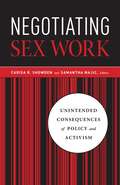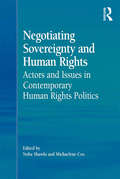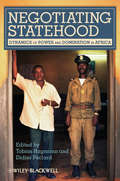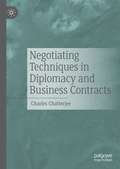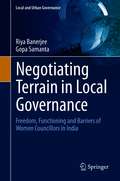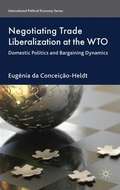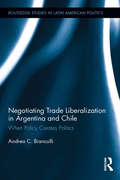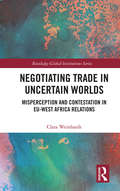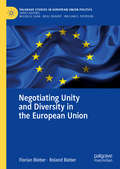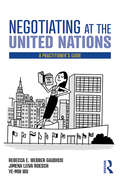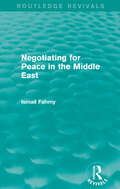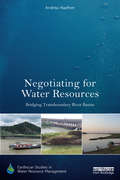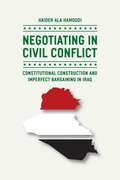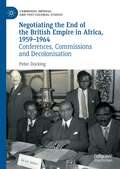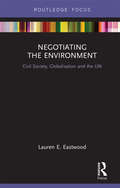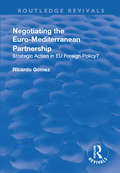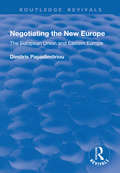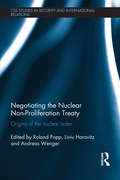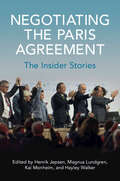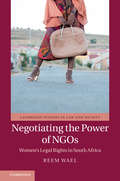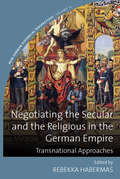- Table View
- List View
Negotiating Sex Work: Unintended Consequences of Policy and Activism
by Samantha Majic Carisa R. ShowdenGlobally, discussions about sex work focus on exploitation. The media regularly provides us with stories about teen girls coerced to perform sexual acts for money, frequently beaten and robbed by their pimps or traffickers. While one would have to be hard-pressed to deny that sex workers are victimized, the popular media and our political leaders emphasize sex work as exclusively exploitative. In Negotiating Sex Work, Carisa R. Showden and Samantha Majic present a series of essays that depict sex work as an issue far more complex than generally perceived.Positions on sex work are primarily divided between those who consider that selling sexual acts is legitimate work and those who consider it a form of exploitation. Organized into three parts, Negotiating Sex Work rejects this either/or framework and offers instead diverse and compelling contributions that aim to reframe these viewpoints. Part I addresses how knowledge about sex work and sex workers is generated. The next section explores how nations and political actors who claim to protect individuals in sex work often further marginalize them. Finally, part III examines sex workers&’ own political-organizational efforts to combat laws and policies that deem them deviant, sinful, or total victims.A timely and necessary intervention into sex work debates, this volume challenges how policy makers and the broader public regard sex workers&’ capacity to advocate for their own interests.Contributors: Cheryl Auger; Sarah Beer, Dawson College, Montreal; Michele Tracy Berger, U of North Carolina–Chapel Hill; Thaddeus Gregory Blanchette, Federal U of Rio de Janeiro; Raven Bowen; Gregg Bucken-Knapp, U of Gothenburg, Sweden; Ana Paula da Silva, Federal U of Viçosa; Valerie Feldman; Gregor Gall, U of Bradford; Kathleen Guidroz, Georgetown U; Annie Hill, U of Minnesota; Johan Karlsson Schaffer, U of Oslo; Edith Kinney, Mills College; Yasmin Lalani; Pia Levin; Alexandra Lutnick; Tamara O&’Doherty, U of the Fraser Valley, British Columbia; Joyce Outshoorn, U of Leiden; Francine Tremblay, Concordia U, Montreal.
Negotiating Sovereignty and Human Rights: Actors and Issues in Contemporary Human Rights Politics
by Michaelene CoxProviding an overview of institutional developments and innovations in human rights politics, this volume discusses some of the most important current and emerging human rights issues. It takes stock of the initiatives, policy responses and innovations of past years to identify some of the challenges that will likely require bold and innovative solutions. The contributors focus on actors and/or issues that are outside the mainstream of international human rights politics; the chapters address issues that have only emerged as an important part of the international human rights agenda and generated much advocacy, diplomacy and negotiations since the end of the Cold War. These issues include: the International Criminal Court, the norm of Responsibility to Protect (R2P), the proliferation of small arms and light weapons and its human rights impact, truth commissions, and the rights of persons with disabilities. The contributions offer a direct challenge to entrenched notions of state sovereignty and represent a departure from established ways of policy making.
Negotiating Statehood: Dynamics of Power and Domination in Africa (Development and Change Special Issues)
by Didier Péclard Tobias HagmannNegotiating Statehood: Dynamics of Power and Domination in Africa provides a conceptual framework for analysing dynamic processes of state-making in Africa. Features a conceptual framework which provides a method for analysing the everyday making, contestation, and negotiation of statehood in contemporary Africa Conceptualizes who negotiates statehood (the actors, resources and repertoires), where these negotiation processes take place, and what these processes are all about Includes a collections of essays that provides empirical and analytical insights into these processes in eight different country studies in Africa Critically reflects on the negotiability of statehood in Africa
Negotiating Techniques in Diplomacy and Business Contracts
by Charles ChatterjeeDiplomacy is an established discipline, but it is still wearing its old garments,failing to display its capacity to deal with new unique bi-lateral and international disputes. In conformity with the provisions of Article 33 of the UN Charter, thisbook emphasises the need for current-day diplomats to have appropriate training in negotiation and conciliation techniques rather than leaving inter-state or international dispute hearings unsettled with their inevitable consequences.The book also identifies the role and effectiveness of negotiating techniques in conducting business contracts, women’s role in negotiating diplomatic and business deals, negotiating techniques in import-export trade, project finance, and syndicated loan agreements. It further discusses the UN system and diplomacy.The opinions expressed in this book are those of the author, and in no way may be attributed to the institution to which he belongs.
Negotiating Terrain in Local Governance: Freedom, Functioning and Barriers of Women Councillors in India (Local and Urban Governance)
by Gopa Samanta Riya BanerjeeThis book explores and analyses women’s participation in local urban governance in West Bengal, India. It is developed from empirical research with in-depth understanding of ground situations of freedom, functioning and obstacles of women councilors in India. The central idea of this book revolves around two central research questions: 1. How are women’s positions and spaces changing due to their political participation in the urban local governance? and 2. What are the major hurdles they face in their day to day lives barring their emancipation? The main strength of the book lies in the in-depth grounded research in four small cities (Darjiling, Balurghat, Raniganj and Hugli-Chinsurah) using both quantitative and qualitative research methods. This volume can be considered as a reference book for Gender Studies, Women’s Studies, Urban Governance, Women and Policy Research, Gender Development Studies.
Negotiating Trade Liberalization at the WTO
by Eugénia da Conceição-HeldtThis book shows how domestic political institutions and the lack of time pressure have an impact on negotiations at the WTO. It provides detailed information on WTO ministerial meetings as well as on the political economy of trade policy in the EU, U. S. , Brazil, and Australia.
Negotiating Trade Liberalization in Argentina and Chile: When Policy creates Politics (Routledge Studies in Latin American Politics)
by Andrea C. BianculliHow do international negotiations affect domestic politics? Starting in the 1990s, countries throughout Latin America embarked on many and simultaneous negotiations. On the shifting ground of widening and deepening trade agendas and diverse arenas, what factors determined trade politics? This book examines the domestic political dynamics triggered by South-South, North-South and multilateral agendas in Argentina and Chile between 1990 and 2005. Using a much-needed cross-negotiation and cross-country comparative perspectives, and through detailed empirical analyses of several key negotiations, it proposes an explanation that emphasizes the interplay between international negotiations and domestic trade politics, taken as the result of the complex and dynamic interdependencies and interrelations between state and society. Informed by interviews with public officials, businesses and civil society, the analysis reveals that variation in the depth of agendas, the distributional effects and the uncertainty of political outcomes all have important consequences for domestic preference formation, collective action strategies and types of relationships. Given this, the variety of negotiations, when considered separately and comparatively, show that South-South, North-South and multilateral processes promote different patterns of trade politics. In sum, although national specificities and historical legacies are important, the book argues that trade policy comes first in creating domestic politics in Latin America.
Negotiating Trade in Uncertain Worlds: Misperception and Contestation in EU-West Africa Relations (Global Institutions)
by Clara WeinhardtThis book shows how a constructivist account of bargaining sheds new light on the emergence of impasse situations in international trade negotiations. It uncovers the subtle ways in which misperceptions – and the problems of overcoming them – complicate negotiations. It brings to the forefront misperceptions and sticky beliefs that complicate trade talks between the Global South and the Global North. Empirically, the book examines the recent negotiations of Economic Partnership Agreements between the European Union (EU) and West Africa (2002–2014). In doing so, it enriches the study of negotiations of development-oriented trade agreements in the context of a major North-South partnership. By exploring a constructivist perspective on game theory, the author uncovers how the repeated impasse situations followed from the different "games" both sides expected to be playing. The author shows that such misperceptions endured because they reflected deep-seated normative disagreements not only over the effects of neo-liberal trade reforms, but also over how to structure EU – Africa post-colonial trade relations in the 21st century. Comparing and contrasting both sides’ divergent perspectives helps us to see how trade negotiations are never just about economic interests, but also about the (re)negotiation of the values and ideas that structure state interaction. The book draws on a large set of qualitative primary data on EU-West Africa trade negotiations. Negotiating trade in uncertain worlds will be of great interest to students and scholars of international relations, international political economy, international trade, international negotiations, EU external relations, EU-Africa cooperation, economic diplomacy, international relations of the developing world, and North-South cooperation.
Negotiating Unity and Diversity in the European Union (Palgrave Studies in European Union Politics)
by Florian Bieber Roland BieberThis book explores how the European Union has been responding to the challenge of diversity. In doing so, it considers the EU as a complex polity that has found novel ways for accommodating diversity. Much of the literature on the EU seeks to identify it as a unique case of cooperation between states that moves past classic international cooperation. This volume argues that in order to understand the EU’s effort in managing the diversity among its members and citizens it is more effective to look at the EU as a state. While acknowledging that the EU lacks key aspects of statehood, the authors show that looking at the EU efforts to balance diversity and unity through the lens of state policy is a fruitful way to understand the Union. Instead of conceptualising the EU as being incomparable and unique which is neither an international organisation nor a state, the book argues that EU can be understood as a polity that shares many approaches and strategies with complex and diverse states. As such, its effort to build political structures to accommodate diversity offers lessons to other such polities. The experience of the EU contributes to the understanding of how states and other polities can respond to challenges of diversity, including both the diversity of constituent units or of sub-national groups and identities.
Negotiating at the United Nations: A Practitioner's Guide
by Rebecca W. Gaudiosi Jimena Leiva Roesch Wu Ye-MinThis book offers a comprehensive practitioner's guide to negotiating at the United Nations. Although much of the content can be applied broadly, the guide focuses on navigating multilateral negotiations at the UN. The book is a tool to help new UN negotiators, explaining basic negotiation concepts and offering insight into the complexities of the UN system. It also offers a playbook for cooperation for negotiators at any level, exploring the dynamics of relationships and alliances, the art of chairing a negotiation, and the importance of balancing the power asymmetries present in any multilateral discussion. The book proposes improvements to the UN negotiation process and looks at the impact of information technologies on negotiation dynamics; it also shares stories from women UN delegates, illustrating what it means to be a female negotiator at the UN. This book is an exploration of the power of the individual in any negotiation, and of the responsibility all negotiators have in wielding that power to speak for a better world. This book will be of much interest to students of diplomacy, global governance, foreign policy, and International Relations, as well as practitioners and policymakers.
Negotiating for Peace in the Middle East (Routledge Revivals)
by Ismail FahmyIsmail Fahmy was Minister of Foreign Affairs and Deputy Premier of Egypt, but resigned in protest against President Sadat’s visit to Jerusalem in 1977. This book, published in 1983, presents the first portrait of Sadat from within the Arab ruling elite, and gives unique coverage of the crucial negotiations that took place between Arab leaders, which determined the key events during this period. Fahmy vividly recounts the years when prospects for a permanent peace in the Middle East seemed a real possibility and presents a damning portrayal of the roles that Kissinger, Nixon and Carter played in events. This is a fascinating account of the struggle for peace in the Middle East, written from the unique perspective of a hugely influential contemporary at the heart of the dialogue.
Negotiating for Water Resources: Bridging Transboundary River Basins (Earthscan Studies in Water Resource Management)
by Andrea HaefnerOver 90 per cent of the world population lives in countries that share a river basin with others. Freshwater resources are scarce and different nations, actors and users compete for limited resources in transboundary river basins; often conflicting with each other. Water is a resource with no substitute: it cannot be secured in sufficiently large quantities through long-distance trade deals; and, due to the interconnectivity of the hydrological system, the actions of one country in its water management have a direct bearing on the interests of neighbouring countries. For instance, in the Mekong River Basin, current hydropower and navigation developments in certain countries impact on traditional sources of income such as fisheries, and rice production in others. These kinds of changes in water use have given rise to conflict between countries in that region and others, but have also led, in some cases, to greater cooperation. The past few decades have seen a number of new agreements about the sharing of river resources and cooperation between riparian states. Negotiating for Water Resources explores the drivers of conflict and cooperation between states in transnational river basins. Drawing on extensive fieldwork and interviews on the Mekong, Danube and La Plata River Basins, the book provides a three level analysis across three case studies, including the regional framework (EU, ASEAN and Mercosur), the River Basin Organisations (ICPDR, MRC and CIC) and the micro-level. The key question of the book is: To what extent do power asymmetries prevent or inhibit cooperation between riparian states over water resources? This is linked to the question of how institutions contribute to mitigate competition for natural resources and how states interact in a multilateral arena. Overall, the book argues that cooperation in transboundary river basins is possible even where there are asymmetric power relations, challenging realist assumptions about competition and conflict over resources.
Negotiating in Civil Conflict: Constitutional Construction and Imperfect Bargaining in Iraq
by Haider Ala HamoudiIn 2005, Iraq drafted its first constitution and held the country’s first democratic election in more than fifty years. Even under ideal conditions, drafting a constitution can be a prolonged process marked by contentious debate, and conditions in Iraq are far from ideal: Iraq has long been racked by ethnic and sectarian conflict, which intensified following the American invasion and continues today. This severe division, which often erupted into violence, would not seem to bode well for the fate of democracy. So how is it that Iraq was able to surmount its sectarianism to draft a constitution that speaks to the conflicting and largely incompatible ideological view of the Sunnis, Shi’ah, and Kurds? Haider Ala Hamoudi served in 2009 as an adviser to Iraq’s Constitutional Review Committee, and he argues here that the terms of the Iraqi Constitution are sufficiently capacious to be interpreted in a variety of ways, allowing it to appeal to the country’s three main sects despite their deep disagreements. While some say that this ambiguity avoids the challenging compromises that ultimately must be made if the state is to survive, Hamoudi maintains that to force these compromises on issues of central importance to ethnic and sectarian identity would almost certainly result in the imposition of one group’s views on the others. Drawing on the original negotiating documents, he shows that this feature of the Constitution was not an act of evasion, as is sometimes thought, but a mark of its drafters’ awareness in recognizing the need to permit the groups the time necessary to develop their own methods of working with one another over time.
Negotiating in Civil Conflict: Constitutional Construction and Imperfect Bargaining in Iraq
by Haider Ala HamoudiIn 2005, Iraq drafted its first constitution and held the country’s first democratic election in more than fifty years. Even under ideal conditions, drafting a constitution can be a prolonged process marked by contentious debate, and conditions in Iraq are far from ideal: Iraq has long been racked by ethnic and sectarian conflict, which intensified following the American invasion and continues today. This severe division, which often erupted into violence, would not seem to bode well for the fate of democracy. So how is it that Iraq was able to surmount its sectarianism to draft a constitution that speaks to the conflicting and largely incompatible ideological view of the Sunnis, Shi’ah, and Kurds? Haider Ala Hamoudi served in 2009 as an adviser to Iraq’s Constitutional Review Committee, and he argues here that the terms of the Iraqi Constitution are sufficiently capacious to be interpreted in a variety of ways, allowing it to appeal to the country’s three main sects despite their deep disagreements. While some say that this ambiguity avoids the challenging compromises that ultimately must be made if the state is to survive, Hamoudi maintains that to force these compromises on issues of central importance to ethnic and sectarian identity would almost certainly result in the imposition of one group’s views on the others. Drawing on the original negotiating documents, he shows that this feature of the Constitution was not an act of evasion, as is sometimes thought, but a mark of its drafters’ awareness in recognizing the need to permit the groups the time necessary to develop their own methods of working with one another over time.
Negotiating the Arctic: The Construction of an International Region (Studies in International Relations)
by E.C.H KeskitaloThis work draws upon the history of Arctic development and the view of the Arctic in different states to explain how such a discourse has manifested itself in current broader cooperation across eight statistics analysis based on organization developments from the late 1970s to the present, shows that international region discourse has largely been forwarded through the extensive role of North American, particularly Canadian, networks and deriving form their frontier-based conceptualization of the north.
Negotiating the Christian Past in China: Memory and Missions in Contemporary Xiamen (World Christianity)
by Jifeng LiuAt the turn of the twenty-first century, Xiamen’s pursuit of World Heritage Site designation from UNESCO stimulated considerable interest in the city’s Christian past. History enthusiasts, both Christian and non-Christian, devoted themselves to reinterpreting the legacy of missionaries and challenged official narratives of Christianity’s troubled associations with Western imperialism. In this book, Jifeng Liu documents the tension that has inevitably emerged between the established official history and these popular efforts.This volume elucidates the ways in which Christianity has become an integral part of Xiamen, a Chinese city profoundly influenced by Western missionaries. Drawing on extensive interviews, locally produced histories, and observations of historical celebrations, Liu provides an intimate portrait of the people who navigate ideological issues to reconstruct a Christian past, reproduce religious histories, and redefine local power structures in the shadow of the state. Liu makes a compelling argument that a Christian past is being constructed that combines official frameworks, unofficial practices, and nostalgia into social memory, a realm of dynamic negotiation that is neither dominated by the authoritarian state nor characterized by popular resistance. In this way, Negotiating the Christian Past in China illustrates the complexities of memory and missions in shaping the city’s cultural landscape, church-state dynamics, and global aspirations.This groundbreaking study assumes a perspective of globalization and localization, in both the past and the present, to better understand Chinese Christianity in a local, national, and global context. It will be welcomed by scholars of religious studies and world Christianity, and by those interested in the church-state relationship in China.
Negotiating the Deal
by Christopher AlcantaraThis book provides the first systematic and comprehensive analysis of the factors that explain both completed and incomplete treaty negotiations between Aboriginal groups and the federal, provincial, and territorial governments of Canada. Since 1973, groups that have never signed treaties with the Crown have been invited to negotiate what the government calls "comprehensive land claims agreements," otherwise known as modern treaties, which formally transfer jurisdiction, ownership, and title over selected lands to Aboriginal signatories. Despite their importance, not all groups have completed such agreements - a situation that is problematic not only for governments but for Aboriginal groups interested in rebuilding their communities and economies.Using in-depth interviews with Indigenous, federal, provincial, and territorial officials, Christopher Alcantara compares the experiences of four Aboriginal groups: the Kwanlin Dün First Nation (with a completed treaty) and the Kaska Nations (with incomplete negotiations) in Yukon Territory, and the Inuit (completed) and Innu (incomplete) in Newfoundland and Labrador. Based on the experiences of these groups, Alcantara argues that scholars and policymakers need to pay greater attention to the institutional framework governing treaty negotiations and, most importantly, to the active role that Aboriginal groups play in these processes.
Negotiating the End of the British Empire in Africa, 1959-1964: Conferences, Commissions and Decolonisation (Cambridge Imperial and Post-Colonial Studies)
by Peter DockingThis book examines conferences and commissions held for British colonial territories in East and Central Africa in the early 1960s. Until 1960, the British and colonial governments regularly employed hard methods of colonial management in East and Central Africa, such as instituting states of emergency and imprisoning political leaders. A series of events at the end of the 1950s made hard measures no longer feasible, including criticism from the United Nations. As a result, softer measures became more prevalent, and the use of constitutional conferences and commissions became an increasingly important tool for the British government in seeking to manage colonial affairs.During the period 1960-64, a staggering sixteen conferences and ten constitutional commissions were held for British colonies in East and Central Africa. This book is the first of its kind to provide a detailed overview of how the British sought to make use of these events to control and manage the pace of change. The author also demonstrates how commissions and conferences helped shape politics and African popular opinion in the early 1960s. Whilst giving the British government temporary respite, conferences and commissions ultimately accelerated the decolonisation process by transferring more power to African political parties and engendering softer perceptions on both sides. Presenting both British and African perspectives, this book offers an innovative exploration into the way that these episodes played an important part in the decolonisation of Africa. It shows that far from being dry and technical events, conferences and commissions were occasions of drama that tell us much about how the British government and those in Africa engaged with the last days of empire.
Negotiating the Environment: Civil Society, Globalisation and the UN (Routledge Focus on Environment and Sustainability)
by Lauren E EastwoodCivil society participants have voiced concerns that the environmental problems that were the subject of multilateral environmental agreements negotiated during the 1992 Rio processes are not serving to ameliorate global environmental problems. These concerns raise significant questions regarding the utility of negotiating agreements through the UN. This book elucidates the complexity of how participants engage in these negotiations through the various processes that take place under the auspices of the UN—primarily those related to climate and biological diversity. By taking an ethnographic approach and providing concrete examples of how it is that civil society participants engage in making policy, this book develops a robust sense of the implications of the current terrain of policy-making—both for the environment, and for the continued participation of non-state actors in multilateral environmental governance. Using data gathered at actual negotiations, the book develops concepts such as participation and governance beyond theory. The research uses participant observation ethnographic methods to tie the theoretical frameworks to people’s actual activities as policy is generated and contested. Whereas topics associated with global environmental governance are traditionally addressed in fields such as international relations and political science, this book contributes to developing a richer understanding of the theories using a sociological framework, tying individual activities into larger social relations and shedding light on critical questions associated with transnational civil society and global politics.
Negotiating the Euro-Mediterranean Partnership: Strategic Action in EU Foreign Policy? (Routledge Revivals)
by Ricardo GomezThis title was first published in 2003. In this study Ricardo Gomez traces the origins of the external Mediterranean policy of the European Union (EU) and examines in detail the negotiations that shaped the policy and its impact. Combining historical analysis with case studies of the Euro-Med partnership initiative, EU policy on Algeria and the EU's involvement in the Middle East peace process, he covers a diverse array of issues that will appeal to scholars across a variety of sub-disciplines of political science and international relations.
Negotiating the New Europe: The European Union and Eastern Europe (Routledge Revivals)
by Dimitris PapadimitriouThis title was first published in 2002: Offering a new and challenging perspective on how the European Union (EU) sought to structure its relations with Central and Southeast Europe after the Cold War, this volume draws upon key debates in both politics and international relations. A historically and theoretically informed examination of the EU's engagement in Central and Eastern Europe since 1989, the book combines conceptual rigour with clear empirical analysis, firmly grounding the study of the European Union's current enlargement process in established theoretical perspectives. The book is written in an engaging and accessible way, which will appeal to academics, students and practitioners alike.
Negotiating the Nuclear Non-Proliferation Treaty: Origins of the Nuclear Order (CSS Studies in Security and International Relations)
by Andreas Wenger Roland Popp Liviu HorovitzThis volume offers a critical historical assessment of the negotiation of the Treaty on the Non-Proliferation of Nuclear Weapons (NPT) and of the origins of the nonproliferation regime. The NPT has been signed by 190 states and was indefinitely extended in 1995, rendering it the most successful arms control treaty in history. Nevertheless, little is known about the motivations and strategic calculi of the various middle and small powers in regard to their ultimate decision to join the treaty despite its discriminatory nature. While the NPT continues to be central to current nonproliferation efforts, its underlying mechanisms remain under-researched. Based on newly declassified archival sources and using previously inaccessible evidence, the contributions in this volume examine the underlying rationales of the specific positions taken by various states during the NPT negotiations. Starting from a critical appraisal of our current knowledge of the genesis of the nonproliferation regime, contributors from diverse national and disciplinary backgrounds focus on both European and non-European states in order to enrich our understanding of how the global nuclear order came into being. This book will be of much interest to students of nuclear proliferation, Cold War history, security studies and IR.
Negotiating the Paris Agreement: The Insider Stories
by Hayley WalkerThe 2015 Paris Agreement represents the culmination of years of intense negotiations under the United Nations Framework Convention on Climate Change. Designed to curb climate change, it was negotiated by almost 200 countries who came to the table with different backgrounds, perceptions and interests. As such, the Agreement represents a triumph for multilateralism in a period otherwise characterized by nationalist turns. How did countries reach the historical agreement, and what were the driving forces behind it? This book paints a full picture by providing and analysing multifaceted insider accounts from high-level delegates who represented developed and developing countries, civil society, businesses, the French Presidency, and the UNFCCC Secretariat. In doing so, the book documents not only the negotiation of the Paris Agreement but also the dynamics and factors that shaped it. A better understanding of these dynamics and factors can guide future negotiations and help us solve global challenges.
Negotiating the Power of NGOs: Women's Legal Rights in South Africa (Cambridge Studies in Law and Society)
by Reem WaelThis book focuses on the socio-political environment that allows for the impactful work of NGOs through their proximity to local communities. The book showcases how this space has helped South African women's rights NGOs to bring about crucial legal reforms, which are quite relevant to women's lived realities. Recognizing its limitations, the South African state encourages NGOs to work freely on the ground and with state institutions to ameliorate the conditions for women's rights. The outcome of this state-NGO dynamic can be seen in the numerous human rights gains achieved by NGOs in general, and by women's rights organizations specifically. In addition, vulnerable communities such as women living under customary law have a significantly better chance to access justice. The book then demonstrates the opposite scenario, using Egypt as a case study, where NGOs are viewed as a national threat, and consequently operate under restrictive rules.
Negotiating the Secular and the Religious in the German Empire: Transnational Approaches (New German Historical Perspectives #10)
by Rebekka HabermasWith its rapid industrialization, modernization, and gradual democratization, Imperial Germany has typically been understood in secular terms. However, religion and religious actors actually played crucial roles in the history of the Kaiserreich, a fact that becomes particularly evident when viewed through a transnational lens. In this volume, leading scholars of sociology, religious studies, and history study the interplay of secular and religious worldviews beyond the simple interrelation of practices and ideas. By exploring secular perspectives, belief systems, and rituals in a transnational context, they provide new ways of understanding how the borders between Imperial Germany’s secular and religious spheres were continually made and remade.
